The hymn “Come, Come, Ye Saints” is possibly more closely identified with the Mormons than any other. It was written in the morning of April 15, 1846, which was the day its composer, William Clayton, learned his wife had given birth to a son.
The time was after Joseph Smith, the first prophet of the Church of Jesus Christ of Latter-day Saints, sometimes called Mormons, had been murdered. Brigham Young had assumed leadership of the church. Unfortunately, the murder had not led to safer conditions for the Mormons, and they were forced to travel west to escape persecution and death.
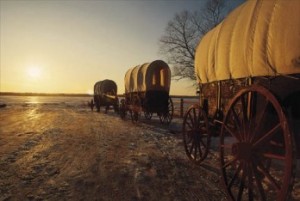 William Clayton was among those who traveled west. He had become a Mormon in the early 1880s in England, a convert from the Church of England. He was only 24 years old when he joined, but was well-educated and skilled at numbers, writing, and record keeping. He quickly become a trusted leader in the little group of Mormons there.
William Clayton was among those who traveled west. He had become a Mormon in the early 1880s in England, a convert from the Church of England. He was only 24 years old when he joined, but was well-educated and skilled at numbers, writing, and record keeping. He quickly become a trusted leader in the little group of Mormons there.
At the age of twenty-four, he and his wife immigrated to the United States and went to Nauvoo, Illinois, a city founded by the Mormons. He served as Joseph Smith’s secretary, sometimes transcribing revelations from the prophet. When Joseph died, there were disagreements over who should run the church. Clayton wisely supported Brigham Young and was soon serving President Young in much the same way he had served Joseph Smith. His reputation as one who was intelligent and trustworthy led to his assignment to lead a group of pioneers. His wife, pregnant, stayed behind in Nauvoo during this first trip.
William Clayton was a talented musician who played the violin. During the preparations for the move, Brigham Young assigned Clayton to purchase instruments and form a brass band. A gifted leader, Young understood morale would be a challenge during a long and dangerous trek, and music would help to keep up spirits.
The journey to Utah was slow and discouraging and the Mormon pioneers made little progress each day as they slogged through the rain and mud. By the time they reached Iowa, many were discouraged.
Clayton spent the trip worrying about his wife and their unborn child, and because communication was so difficult, he did not know for quite some time the baby had come. The child was born healthy, although the mother was very ill with ague and mumps. That evening, the company sang and played music until midnight. Early in that morning, Clayton celebrated by writing the hymn he would be best known for. He named it All is Well and set it to an English tune. It became immediately popular and soon, if anyone began to sing it, everyone was expected to join in. It provided comfort and hope to those making the dangerous journey.
“This morning Ellen Kimball came to me and wishes me much joy. She said Diantha has a son. I told her I was afraid it was not so, but she said Brother Pond had received a letter. I went over to Pond’s and he read that she had a fine fat boy on the 30th ult., but she was very sick with ague and mumps. Truly I feel to rejoice at this intelligence but feel sorry to hear of her sickness. . . . In the evening . . . [several] persons retired to my tent to have a social christening. . . . We named him William Adriel Benoni Clayton. . . . This morning I composed a new song-’All is well.’ I feel to thank my heavenly father for my boy and pray that he will spare and preserve his life and that of his mother and so order it so that we may soon meet again” (William Clayton’s Journal [1921], 19). Quoted on The Pioneer Story
The song, as Clayton hoped, brought hope to the weary pioneers and reminded them God was with them and in the end, no matter what happened on the journey, they were in God’s hands and all was well. Today, the song continues to inspire and uplift members of the Church.
Boyd K. Packer said, “There are many examples, both ancient and modern, that attest to the influence of righteous music. Discouragement disappeared and minds were filled with peace as the words to “Come, Come, Ye Saints” gave the pioneers courage to face their trials. This same song has been an inspiration to many over the years. At one time I was talking to a pilot who had just returned from a hazardous flight. We spoke of courage and of fear, and I asked how he had held himself together in the face of what he had endured. He said, “I have a favorite hymn, and when it was desperate, when there was little hope that we would return, I would keep it on my mind, and it was as though the engines of the aircraft would sing back to me.”
Come, come, ye Saints,
No toil nor labor fear;
But with joy wend your way.
Though hard to you
This journey may appear,
Grace shall be as your day.
From this he clung to faith, the one essential ingredient to courage.” (Boyd K. Packer, “The Message: Worthy Music, Worthy Thoughts,” NewEra, Apr 2008, 6-11)
This song is also included in the hymnbooks of the Seventh Day Adventists and the United Church of Christ, with variations to replace the references to heading west.
About Terrie Lynn Bittner
The late Terrie Lynn Bittner—beloved wife, mother, grandmother, and friend—was the author of two homeschooling books and numerous articles, including several that appeared in Latter-day Saint magazines. She became a member of the Church at the age of 17 and began sharing her faith online in 1992.

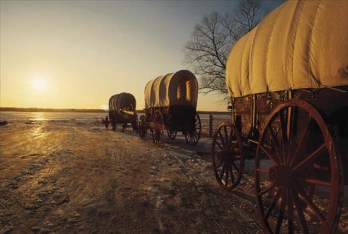
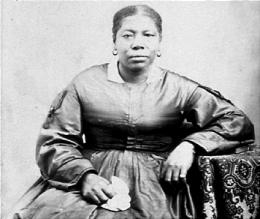
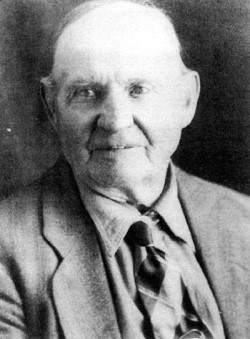

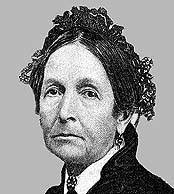

I would like to use this photo on my covered wagon but I need permission to use copy write picture maybe you could help with this and thank you very much
Hi Robert!
This picture was taken from ChurchofJesusChrist.org, I believe. (Click the link to go the specific page it can be found on.) It’s likely a free-for-use picture, but I’d contact them just to be sure!